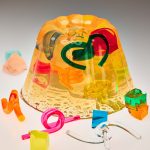
Does a Sprinkle of Sea Salt in Water Make It Healthier?
Of all the things you might consider adding to a glass of water, salt probably isn’t top of the list. Unlike electrolytes, colostrum or collagen supplements, salt is, well, salt. But are we missing a trick? According to TikTok, yes.
Content touting the benefits of adding salt (specifically Celtic) to water, or showing how best to take it (either mixed in or under the tongue and swished), are racking up hundreds of thousands of views on the platform right now. To sort fact from fiction, we enlisted nutritionist and functional medicine practitioner Farzanah Nasser, and nutritionist and hormonal expert Hannah Alderson.
What is Celtic salt?“Celtic salt is an unrefined sea salt from the coastal regions of France,” Nasser explains, going on to describe the process of collecting it: after seawater has evaporated from clay ponds, wooden rakes are used to extract the salt, using minimal processing. “Celtic salt’s light grey color comes from the minerals in the salt and the clay.”
Is Celtic salt the same as table salt?No, these two are more like cousins than siblings. “Celtic salt differs due to its mineral profile, as well as its origin, appearance and sodium content,” Nasser tells Vogue, comparing its 85 to 90% sodium chloride level with Cornish sea salt (98 to 99 per cent sodium chloride) and Himalayan sea salt, harvested in Khewra in Pakistan, which has 95 to 96% sodium chloride content.
Most of the videos that claim you can benefit from improved digestion and glowier skin as a result of ingesting Celtic salt point to the 80 trace minerals it contains. (Trace minerals help with bodily processes such as immune and nervous system function, metabolism, and bone health, and include zinc, potassium, selenium, iodine, copper, and manganese.)
“Celtic salt does contain trace minerals, but their quantities are very small,” Nasser says. To reap the benefits of the salt, she recommends following Dr Zach Bush’s approach and rehydrating with a glass of water with a little salt—like Celtic salt—and a squeeze of lemon for potassium and vitamin C. “It’s a better and much more balanced way to rehydrate.”
Could Celtic salt replace an electrolyte supplement?No. “Electrolyte supplements provide a balanced mix of sodium, potassium, magnesium, chloride, and calcium,” Nasser explains. Subbing in Celtic salt will provide some sodium but, in her words, “negligible amounts of other minerals”, negating the full spectrum needed for muscle, nerve, and hydration balance.
Is there anyone who should avoid taking Celtic salt?Many people, says Alderson. “Excessive salt intake can raise blood pressure and strain the heart and kidneys,” she warns. “In fact, it’s easy to overshoot the recommended daily sodium limits,” even before adding salt to water. Specifically, anyone with hypertension, kidney disease, or heart failure, as well as anyone placed on a sodium-restricted diet, should avoid adding salt to water – unless explicitly advised to do so by a healthcare provider, says Alderson.
The recommended daily amount of sodium chloride (salt) for adults is no more than 6g a day, which is about one level teaspoon. This translates to 2.4g of sodium.
For most healthy people, a pinch of salt in a glass of water is unlikely to do any harm, but there are better ways to reap the benefits. “Proper rehydration strategies like good old water, electrolyte solutions, and mineral-rich foods,” are to be prioritised, Alderson says.
A final word on drinking water with Celtic saltAccording to Alderson, the benefits of adding Celtic salt to water are a possibility, at best. “They could, potentially, improve hydration and electrolyte balance, but the jury is still out,” she says. “You could be in danger of consuming excessive salt,” she warns.
Have a beauty or wellness trend you’re curious about? We want to know! Send Vogue’s senior beauty & wellness editor an email at [email protected].










